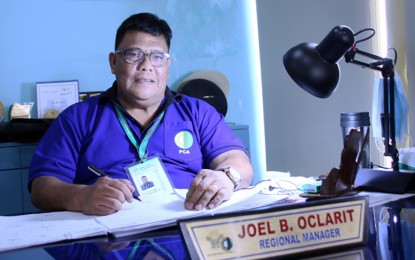
Philippine Coconut Authority-Caraga Manager Joel B. Oclarit. (PNA file photo by Alexander Lopez)
BUTUAN CITY – Scholarship for children, continuing education and training, infrastructure, and medical support are some of the benefits that coconut farmers can avail of once they are registered under the National Coconut Farmers Registry System (NCFRS) of the Philippine Coconut Authority (PCA).
This was emphasized by PCA Caraga Regional Manager Joel B. Oclarit in an interview with the Philippine News Agency on Monday.
Oclarit said registration to NCFRS is now ongoing in Caraga Region through the barangays, the municipal and city levels, and provincial and regional levels.
“We are targeting around 176,298 coconut farmers to be registered in Caraga Region for NCFRS,” Oclarit said.
Since December last year, at least 21,202 coconut farmers in the region have registered in NCFRS and the number is expected to increase by next month as the registration continues.
Support to coconut farmers is strengthened with the signing of Republic Act 11524 or the Coconut Farmer and Industry Act by President Rodrigo R. Duterte in February this year.
“This year, we are expecting the release of PHP10 billion to the trust fund for the coconut farmers as mandated by RA 11524. This amount will go down for the benefit of our coconut farmers in the country, including here in the Caraga Region,” Oclarit said.
He added that coconut farmers registered to the NCFRS would directly benefit as individual beneficiaries or through their organizations from the trust fund.
“They can avail, as individual coconut farmers of life insurance, medical support, and scholarship for their children,” Oclarit said.
He added that organizations of coconut farmers would also benefit from training and continuing education programs; dispersals of high-quality seedlings and livestock through crop diversification programs; credit through the government lending facilities, crop insurance, infrastructure through farm-to-market roads (FMRs); funding through cooperatives; farm mechanization; and the processing and development of coconut products such as coco sugar and virgin coconut oil.
“All these benefits are implemented with the support of other line agencies of the government as stipulated under the newly-signed law. A certain percentage of the yearly trust fund will be transferred to these agencies to support our coconut farmers,” Oclarit said.
Under the law, PHP10 billion will be transferred by the Bureau of Treasury (BTr) to the trust fund for coconut farmers this year, another PHP10 billion in the second year, PHP15 billion in the third year, another PHP15 billion in the fourth year, and PHP25 billion in the fifth year.
“Eight percent of the budget per year will be allocated to the Technical Education and Skills Development Authority (TESDA) and the Agricultural Training Institute (ATI) for the training of coconut farmers while five percent will be allocated to the Department of Science and Technology (DOST) for the research and production of hybrid coconut seedlings,” Oclarit said.
A separate five percent will also be allocated to the Department of Trade and Industry (DTI), particularly to the Bureau of Micro, Small and Medium Enterprise Development for research, marketing and promotion. At least 10 percent of the yearly fund would be allocated to the Department of Agriculture (DA) for crop diversification and intercropping with livestock.
Oclarit said another 10 percent would also go to the Philippine Center for Postharvest Development and Mechanization (PhilMech); five percent to the Cooperative Development Authority (CDA); 10 percent to the Development Bank of the Philippines (DBP) and Land Bank of the Philippines (LBP) for loan programs; and 10 percent to the Department of Public Works and Highways (DPWH) for infrastructure programs.
“Eight percent will also be allocated to the Commission on Higher Education (CHED) for the scholarship of the children of our coconut farmers while 10 percent will be allocated for health programs that the PCA regional offices will implement,” Oclarit added.
He is also optimistic that the PCA in Caraga will hit the 176,298 target coconut farmers to be registered to the NCFRS this year in the region. (PNA)
